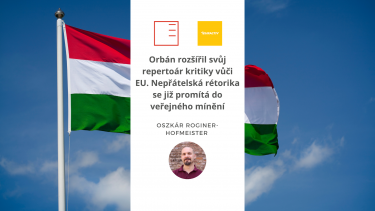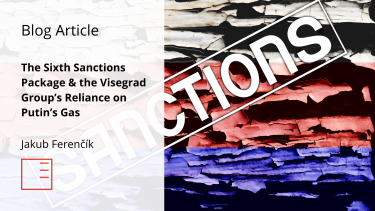Radiožurnál: Hungary without the Presidency? A slap in the face for Orbán and a sign of EU frustration with his policies, says expert
In the Bruselské chlebíčky podcast, the head of the Brussels office of the EUROPEUM think-tank comments on the situation with the upcoming European Presidency. The incoming Spanish presidency is currently open-ended, due to the upcoming Spanish elections, and the Hungarian presidency next year is one that MEPs would prefer to abolish altogether.
Show more
Think Visegrad Fellowship offer: Call for proposals 2023
The Think Visegrad platform, which brings together think tanks from the Visegrad countries, including the EUROPEUM Institute for European Policy, is offering eight visiting fellowships to non-Visegrad expert fellows for the period Autumn/Winter of 2023. The duration of fellowships varies from 6 to 8 weeks (based on agreement with the hosting institute).
Show morePolicy Paper | The future is electric: role of Visegrad countries in the EV battery supply chain
The car industry is a crucial player for the economies of each Visegrad country, but to remain competitive adaptation is necessary. Since the shift from ICE to EVs leads to a substantial need for Critical Raw Materials (CRM), the V4 countries have and must continue to position themselves along the different parts of the EV battery supply chain from mining, refining to manufacturing, reuse and recycling as well as R&D into new battery chemistries. The future is electric: role of the Visegrad countries in the EV battery supply chain report addresses areas for Visegrad countries to ensure a sustainable and reliable EV battery supply chain.
Show more PDF
Euractiv: Orbán expanded his repertoire of criticism of the EU. The hostile rhetoric is already being reflected in public opinion
About what kind of policy is Victor Orbán leadinng towards European Union and his upcoming annual speach, wrote for Euractiv Oszkár Roginer, Global EU project manager from the EUROPEUM Institute.
Show more
SUMMARY OF EXPERIENCES WITH THE INVOLVEMENT OF CSOS IN V4 IN THE DECARBONISATION PROCESS
The project is focused on the examination of the role of non-governmental organizations in the process of decarbonization of coal regions in V4 countries (Czech Republic, Hungary, Poland, Slovakia). The aim of the project is to describe the best and worst practices of the individual processes for Serbia, who awaits the transformation of its energy mix, largely based on coal. The examined V4 countries have had a slightly different share of coal in their energy mix, while the largest one being in Poland and the second largest one in the Czech Republic, followed by Hungary and Slovakia. There are many similarities and differences in their takes on decarbonisation, thus providing different range of experiences.
Show more PDF

iROZHLAS: Suspension of the Erasmus programme for Hungary? "Punishment and isolation of students."
Hungarian students from 21 universities are at risk of not being able to participate in the Erasmus+ education programme. The European Commission has temporarily cut them off. "The students who stand to lose the most from Erasmus are not the children of upper-middle-class parents, but those from smaller towns and rural areas. They don't have the means to travel abroad," Hungarist Oszkár Roginer, Global EU project manager at the EUROPEUM Institute, criticised the decision to iROZHLAS.cz.
Show more
Decarbonization of the Industrial Sector: Sustainable Finance as an Opportunity?
EUROPEUM Institute for European Policy partnered up with the institutions from the Visegrad Group countries and now leads the project consortium. The main objective of the project is to identify priority policies that will enable the decarbonisation of heavy industry in a way that is consistent with the commitments of the Visegrad Four countries to limit future global warming to 1.5 °C. To reach this objective, partners conduct original research and engage the local stakeholders.
Show more PNGEmpowering Serbian CSOs involved in the decarbonization process through the V4 experience
Read the background paper for the Belgrade conference, which focuses on the phasing out of coal mining in the V4 countries, to representatives of Serbian civil society. Our project manager and junior researcher Tatiana Mindekova worked on the paper on behalf of EUROPEUM Institute for European Policy.
Show more PDFVisegrad Insight Podcast: Are Czechs or Slovaks Downplaying the V4 Presidency?
Our Senior Research Fellow Jana Juzová was a guest on a podcast hosted by Visegrad Insight, where she discusses the launch of the Czech EU Presidency and the Slovak Presidency of the Visegrad Group.
Show moreBLOG: The Sixth Sanctions Package & the Visegrad Group’s Reliance on Putin’s Gas
Jakub Ferenčík wrote a blog on the current topic: The Sixth Sanctions Package & the Visegrad Group’s Reliance on Putin’s Gas. Russia's aggression in Ukraine has necessitated another package of sanctions, this time in the energy sector. Due to the lack of alternatives for gas supplies, the Visegrad Four countries had a problem with the implementation of the latest sanctions package. In the end, the EU found a consensus and introduced exemptions for the Czech Republic, Slovakia and Hungary.
Show more PDF
Staroměstské náměstí 4/1
Prague 1 - Staré Město
110 00
tel.: +420 212 246 552
email: europeum@europeum.org
https://www.europeum.org









